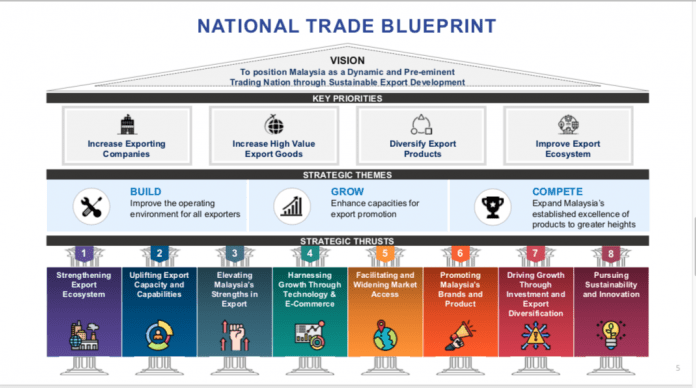The recently launched National Trade Blueprint (NTBp), was formulated to increase Malaysia’s trade competitiveness through an improved business ecosystem while largely being driven by various export concerns.
Commissioned by The Ministry of International Trade and Industry (MITI) and developed by the Malaysia External Trade Development Corporation (MATRADE), the government had concerns relating to the slip in rank from 18th in 2004 to 24th in 2020 in global export rankings. From a regional perspective, the decline in global export ranking saw Thailand and Vietnam overtaking Malaysia. Although Malaysia’s exports are growing, it is not as fast as other countries, reports MATRADE.
According to MATRADE, the Global Competitiveness Index for Malaysia has dropped from 22nd place in 2018 to 25th place in 2021, mainly due to weaker performance in the aspects of skills, finance and business dynamism.
This drew attention to a lack of efficiency amongst ecosystem players and its governance, with a fragmented focus in export related efforts, which has hindered the efficiency of Malaysia’s export ecosystem.
Capitalising on trends that are shaping the global market landscape is crucial for Malaysia to stay relevant. It is therefore important for the nation to have the necessary information to stay ahead in exports.
While SMEs’ contribution to export has been low i.e. 8.5% in 2020 in terms of goods, a high dependence on FDI to drive exports, recorded at 74.1% in 2019 could also lead to export vulnerability.
Taking cue from the concerns and the significance of exports to Malaysia’s economy, it is therefore crucial to ensure exports continue to grow. To address this, the blueprint has been developed to enhance Malaysia’s trade competitiveness, specifically in the exports of merchandise through an improved business ecosystem.
The country’s exports require clear, targeted and impactful action plans that tackle immediate priorities, while building upon Malaysia’s existing strengths and opportunities, strengthening the foundation of the export ecosystem and improve its efficiency though proactive collaborations as well as build capacity by pursuing innovation and gains flexibility & resilience through diversification and market access.









